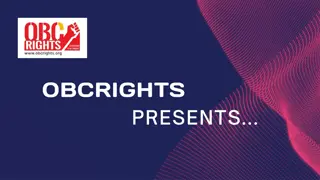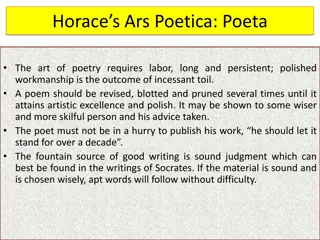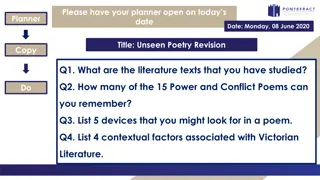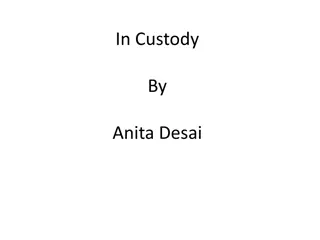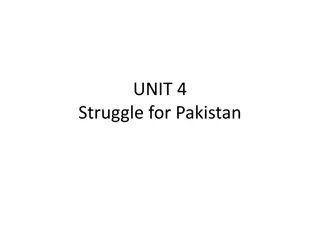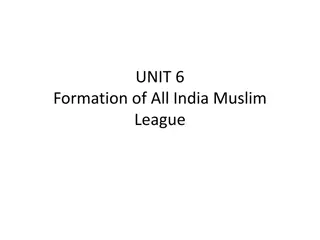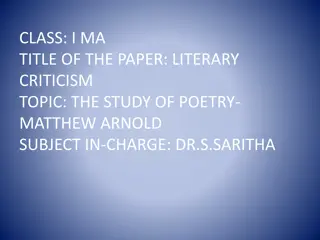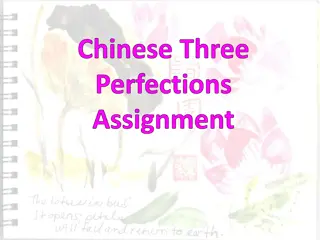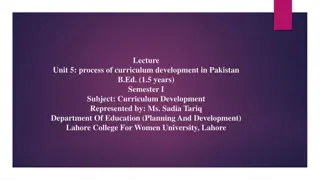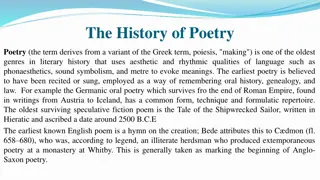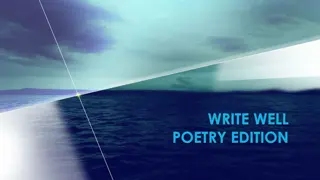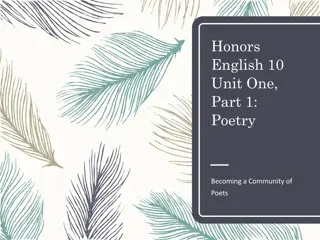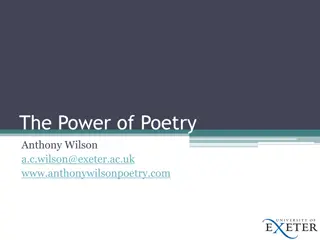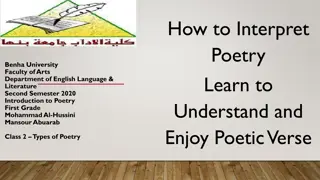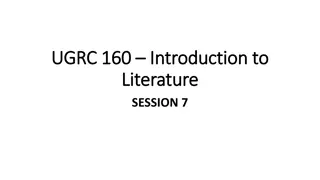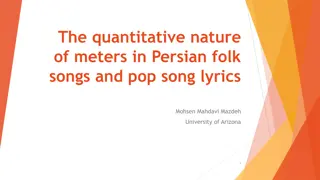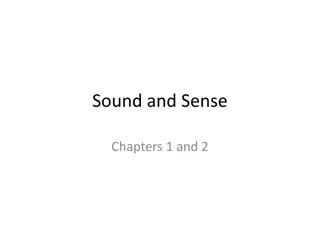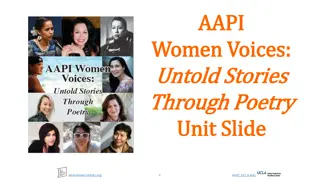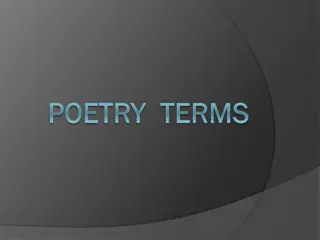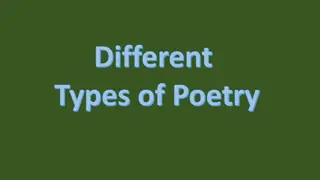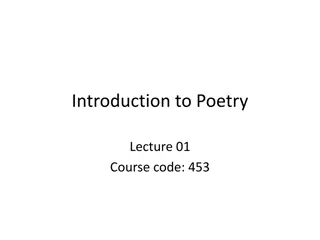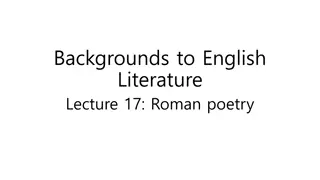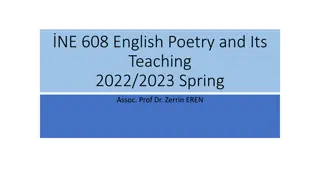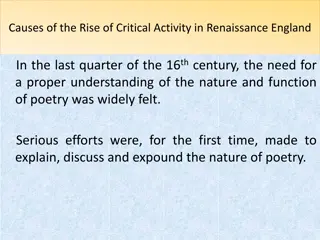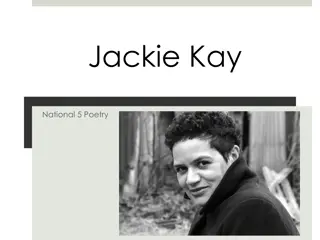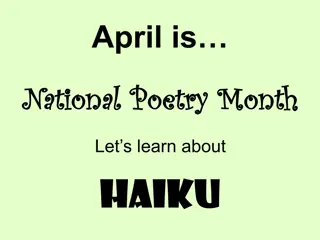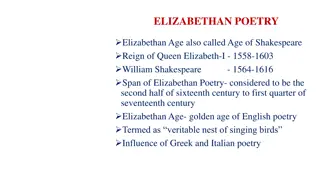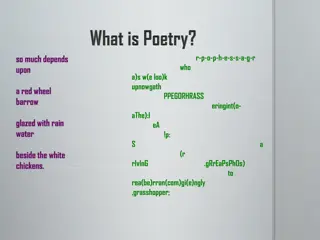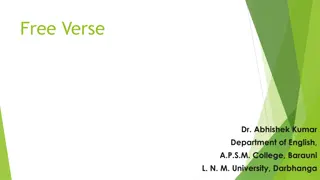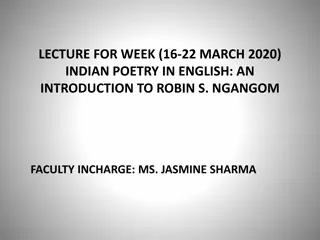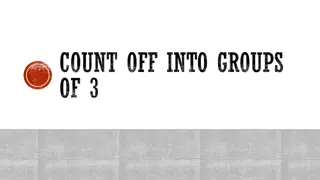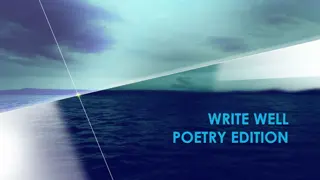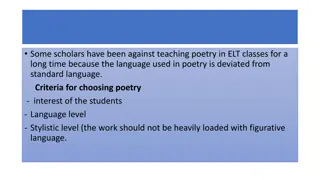Staff Selection Commission
Staff Selection Commission (SSC)\n\nThe Staff Selection Commission (SSC) is a government organization in India that is responsible for selecting candidates for a wide range of positions across different ministries, departments, and subordinate offices of the Indian government.\nFor the first time in
0 views • 5 slides
Overview of Poetry Genres and Elements for English Students
Explore different genres of poetry including narrative, epic, dramatic, satirical, elegy, fable, and prose poetry. Delve into the unique elements of poetry such as diction and figurative devices like simile and metaphor. Engage with various examples from renowned poets and learn about the aesthetic
1 views • 25 slides
Evolution of Modern Poetry in the 20th Century
Modern poetry in English emerged in the early 20th century as a reaction to Victorian formalism. Modernists drew inspiration from diverse literary traditions, including Greek, Chinese, and Japanese poetry, to create works that depicted social changes and the impact of World War I. Themes of material
1 views • 7 slides
Insights from Horace's Ars Poetica on the Art of Poetry
Horace's Ars Poetica, also known as The Art of Poetry, provides timeless insights into the craft of poetry. The text emphasizes the importance of labor, revision, and sound judgment in creating polished and enduring works. It discusses the poet's role as an observer of life, the balance between inst
0 views • 5 slides
Unseen Poetry Revision: Exploring Literary Texts, Devices, and Contexts
Delve into the world of unseen poetry revision by analyzing literary texts, exploring poetic devices, and understanding contextual factors associated with Victorian Literature. Engage in vocabulary challenges, pre-reading activities, and discussions to enhance your understanding of poetry. Enhance y
4 views • 24 slides
In Custody: A Story of Identity and Redemption
In Anita Desai's novel "In Custody," protagonist Deven Sharma grapples with feelings of failure and dissatisfaction as he navigates his unfulfilled dreams of becoming a renowned Urdu poet. When presented with the opportunity to interview his idol, Urdu poet Nur Shahjehanabadi, Deven sees a chance to
7 views • 17 slides
Language Controversy and Political Awakening in Colonial India
Urdu-Hindi language controversy in colonial India sparked a significant cultural and political divide between Hindus and Muslims, leading to the emergence of the Two-Nation Theory. This controversy, along with events like the formation of the Indian National Conference, highlighted growing tensions
0 views • 45 slides
Formation of All India Muslim League in British India
The All India Muslim League was established in 1906 to protect the rights of Indian Muslims and later called for a separate Muslim nation at the time of British India's partition in 1947. Initially supported by the British, the league later aimed for self-government. Reasons for its formation includ
1 views • 15 slides
Matthew Arnold's Literary Criticism: The Study of Poetry
Explore Matthew Arnold's approach to literary criticism focusing on the study of poetry. Arnold's work as a critic of literature, society, and religion is discussed, emphasizing his three estimates of poetry - the Real Estimate, the Historic Estimate, and the Personal Estimate. The Real Estimate hig
1 views • 9 slides
Exploration of 17th Century Literature: Themes, Poets, and Poetry Schools
The literature of the 17th century in London is characterized by melancholic themes, centered around notable figures like John Milton. The era saw the rise of two distinct schools of poetry - metaphysical and cavalier poetry. Metaphysical poets like John Donne employed unconventional metaphors and e
0 views • 5 slides
Chinese Three Perfections: Poetry, Calligraphy, and Painting
Scholars from the Tang period through the Ming era in China highly esteemed the three perfections – poetry, calligraphy, and painting. Calligraphy, considered the highest art form, reveals a person's nature. Poetry, akin to painting with sound, was crucial during the Tang dynasty. Painting, often
3 views • 14 slides
Curriculum Development Process in Pakistan's Education System
The curriculum development process in Pakistan's education system is governed by the Federal Ministry of Education and implemented at the provincial level. The education system consists of three tiers: Elementary (grades 1-8), Secondary (grades 9-12), and University programs. The curriculum focuses
2 views • 36 slides
A Journey Through the History and Elements of Poetry
Explore the rich history of poetry from ancient times to modern eras, delving into its evolution, forms, and significance. Discover the core elements of poetry and its distinctions from prose and drama. Uncover the genres, themes, and iconic works that have shaped the world of poetry as we know it t
1 views • 9 slides
Poetry Playground: A Journey Through Verses and Creativity
Delve into the enchanting world of poetry with Write Well Poetry Edition. Explore the art of crafting "I Am" poems, acrostics, and vibrant expressions. Uncover the simplicity of creating acrostics in five steps and embrace the beauty of poetic imagery. Discover poetry rules, captivating verses, and
1 views • 39 slides
Exploration of Various Poetry Forms: Descriptive, Narrative, Dramatic, and Metaphysical
Poetry is a diverse art form encompassing descriptive portrayal, storytelling narratives, engaging dialogues, and profound metaphysical insights. Descriptive poetry vividly captures objects and scenes like paintings, narrative poetry weaves interconnected stories, dramatic poetry involves dialogues,
1 views • 11 slides
Coleridge's Cardinal Points of Poetry in Biographia Literaria
Coleridge's Chapter 14 in Biographia Literaria delves into the cardinal points of poetry, emphasizing the power to evoke reader sympathy through truth to nature and novelty through imaginative coloring. He discusses the difference between poetry and prose, highlighting the poet's role in crafting or
1 views • 37 slides
The World of Poetry through Music and Empathy
Delve into the realm of poetry through the harmonious blend of music and empathy in the Honors English 10 Unit One, Part 1: Poetry Becoming a Community of Poets. Uncover the profound connection between lyrics and poetic expressions while discovering the power of empathy and support in the poetic jou
1 views • 131 slides
AAPI Women Voices: Untold Stories Through Poetry Curriculum
Explore the empowering journey of AAPI women through poetry with the AAPI Women Voices curriculum. Delve into untold stories, reflect on performances, and discover the impact of poetry in shaping perspectives and voices. Engage in critical reflections, anticipate poetry's essence, and embrace the ar
0 views • 6 slides
The Beauty and Power of Poetry with Anthony Wilson
Dive into the enchanting world of poetry through the writings and reflections of Anthony Wilson, where words come alive in a symphony of emotion and meaning. Experience the essence of poetry as a medium of pure concentration, guiding us to introspection and self-discovery. Discover the joy and depth
0 views • 18 slides
Enjoying Poetry: A Comprehensive Guide
Delve into the world of poetry with this comprehensive guide that explores the differences between prose and poetry, various types of poetry like cinquain and diamante poems, and the essence of haiku. Learn how to interpret and appreciate poetic verse through detailed explanations and examples. Unra
0 views • 26 slides
Introduction to Poetry Analysis: Techniques and Approaches" (66 characters)
Delve into the world of poetry analysis with key insights on understanding the poet's craft, approaching unseen poems confidently, and identifying literary devices to unravel thematic content. Explore how to analyze poems effectively using the ART WARS framework and break free from common misconcept
1 views • 12 slides
Quantitative Meters in Persian Folk Songs and Poetry
Delve into the quantitative nature of meters in Persian folk songs and pop song lyrics as discussed by Mohsen Mahdavi Mazdeh at the University of Arizona. The study explores how syllable weight, vowel length, and metrical patterns play vital roles in classical Persian poetry and the poetry of spoken
0 views • 19 slides
Exploring Various Definitions of Poetry
Delve into the multifaceted nature of poetry through different perspectives such as poetry as a lie according to Plato, poetry as truth per Aristotle, poetry as prophecy as observed by T.S. Eliot, poetry as an expression of emotion according to Wordsworth and Mills, and poetry as substance as articu
0 views • 13 slides
Poetry: Sound and Sense
Poetry is described as a multidimensional form of language that allows us to engage with experience through imagination. It intensifies communication to deepen our understanding of the world. The essence of poetry lies in experiencing emotions and thoughts in a profound and expressive manner. The ex
0 views • 9 slides
AAPI Women's Untold Stories Through Poetry
Delve into the world of AAPI women's voices through poetry, uncovering untold stories and capturing emotions with the power of words. Learn about prominent figures like Janice Mirikitani and their contributions to literature, shedding light on historical injustices and personal experiences. Engage i
0 views • 17 slides
Poetry: Terms and Techniques
Explore the world of poetry with a focus on key terms and techniques such as lyric poetry, myth, rhythm, epithet, imagery, implied metaphor, epic, onomatopoeia, symbolism, alliteration, rhyme, assonance, and personification. Enhance your understanding of these concepts through vivid examples and ima
0 views • 21 slides
Various Types of Poetry in Today's Lesson
Dive into a comprehensive lesson on poetic terms, different types of poetry, and poetic techniques. Discover the beauty of stanzas, lines, rhyme schemes, and explore examples such as palindrome poems. Get ready for a thrilling Poetry Slam where you'll share your favorite style of poetry with the cla
0 views • 25 slides
Poetry: Forms, Devices, and Rhythms
Poetry utilizes various forms, devices, and rhythms to evoke emotions and convey multiple layers of meaning. Poetic devices such as rhyme, rhythm, metaphor, and simile play a crucial role in creating musicality and depth in poems. Understanding the organization of speech rhythms, accent patterns, an
0 views • 45 slides
Overview of Roman Poetry and The Eclogues: A Study in Roman Literature
Roman poetry encompassed various genres such as epic, drama, lyric, satire, and pastoral, with poets like Virgil and Catullus making significant contributions. The neoteric poets, inspired by Hellenistic traditions, added a new dimension to Roman poetry. The Eclogues by Virgil, drawing from Theocrit
2 views • 17 slides
English Poetry: Teaching and Analysis
Dive into the world of English poetry with Assoc. Prof. Dr. Zerrin Eren in NE 608 course. Analyze various poems, discuss the role of poetry in ELT, and explore works by renowned poets like Robert Frost, Sylvia Plath, and more. The course emphasizes teaching strategies, assessment methods, and recomm
0 views • 4 slides
Causes of the Rise of Critical Activity in Renaissance England
In the last quarter of the 16th century, Renaissance England saw a surge in critical activity surrounding poetry. This was spurred by factors such as the medieval view of poetry, the appreciation of poetry in courtly circles, influence from the rediscovery of Aristotle's Poetics, and challenges pose
0 views • 6 slides
Jackie Kay's Life and Poetry
Delve into the life and work of poet Jackie Kay through a fact-finding mission and quiz to understand her background and inspirations. Discover details about her birth, family, challenges faced, career choices, inspirations for poetry, awards received, and themes in her poetry. Engage in discussions
0 views • 17 slides
Haiku Poetry in National Poetry Month
Discover the art of haiku poetry during National Poetry Month. Learn about the structure of haiku, explore featured haikus, and engage in activities to understand and create your own haikus. Dive into the world of nature-inspired verses with syllable counting and animal-themed haikus.
0 views • 10 slides
Insights into Elizabethan Poetry: A Glance at the Golden Age
The Elizabethan Age, also known as the Age of Shakespeare, during Queen Elizabeth I's reign from 1558 to 1603, marked a golden era in English poetry. This period saw a flourishing of poetic forms influenced by Greek and Italian poetry. Major poets like Edmund Spenser, Sir Philip Sidney, and William
0 views • 6 slides
Poetry: Forms, Devices, and Impact
Delve into the world of poetry and prose with an in-depth look at what sets them apart, how authors manipulate stylistic devices to evoke emotions, the significance of performance in poetry, and the role of poetry in advocating for social justice. Discover the beauty and power of poetic expression t
0 views • 13 slides
Free Verse Poetry: Definition, Examples, and Analysis
Free verse poetry, as explored by Dr. Abhishek Kumar, defies traditional poetry rules by liberating poets from meter and rhyme constraints. This form allows unlimited artistic expression through unique structure and uses poetic devices like alliteration and rhythm. Examples from Walt Whitman and Ezr
1 views • 7 slides
Indian Poetry in English through the Works of Robin S. Ngangom
This lecture delves into Indian Poetry in English, focusing on the experimental phase and introducing poet Robin S. Ngangom. It discusses the key features of Indian poetry in the experimental phase, social progress, and Ngangom's background, poetic style, and themes. The lecture sheds light on Ngang
0 views • 7 slides
Poetry: Definition, Analysis, and Appreciation
Delve into the world of poetry through discussions on what poems and poetry are, exploring dictionary definitions, famous quotes, and the transformative power of reading and analyzing poetry. Engage in group activities, examine the works of poets like Mina Loy and Mark Yakich, and discover the uniqu
0 views • 8 slides
World of Poetry
Immerse yourself in the beauty of poetry with introductions, I Am poems, acrostic poetry, creative steps, astonishing actions, and rules for writing good poetry. Delve into the magic of words and discover the power of expression through verses that captivate the soul.
2 views • 51 slides
Benefits of Teaching Poetry in ELT Classes
Poetry can be a valuable tool in English language teaching, offering opportunities for pronunciation practice, interpretation, and skill development. By incorporating poetry, students can enhance their critical and creative thinking, boost intrinsic motivation, and improve their language proficiency
0 views • 5 slides
